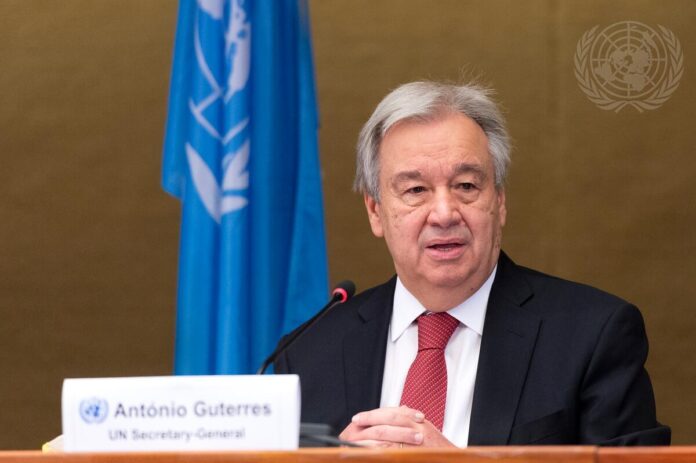THE SECRETARY-GENERAL
—
REMARKS TO HIGH-LEVEL MEETING ON FINANCING FOR DEVELOPMENT IN THE ERA OF COVID-19 AND BEYOND:
JOBS AND SOCIAL PROTECTION FOR POVERTY ERADICATION
New York, 28 September 2021
Excellencies, Ladies and Gentlemen,
Almost two years into the COVID-19 crisis, a huge divergence in the recovery is undermining global trust and solidarity.
The pandemic has not only confirmed but deepened existing inequalities.
In developed countries, access to vaccines has allowed economies to reopen, while stimulus payments and investments herald projected growth of 5 or 6 percent this year.
In sub-Saharan Africa, that figure is just 2.5 percent.
A recent report by UNCTAD, the United Nations Conference on Trade and Development, forecast that the cumulative cost of delayed vaccination alone will amount to $2.3 trillion by 2025, with developing countries bearing the brunt.
This could lead not only to a lost decade for development, but to a lost generation of poorly educated, unemployed, disaffected young people.
Across the developing world, the pandemic has caused lasting damage, while debt burdens prevent governments from investing in recovery.
Advanced economies are investing nearly 28 per cent of their Gross Domestic Product into economic recovery.
For middle- and low-income countries, that number is between 2 and 6.5 per cent – a tiny proportion of a much smaller amount.
Many of these same developing countries are facing the worst ravages of the climate crisis, which they did nothing to create.
Global solidarity so far has been completely inadequate.
This uneven, unfair recovery is eroding trust between the developed and developing world – trust that is essential to global cooperation in other areas.
Today’s meeting is an opportunity to change course and build a recovery that benefits all.
Excellencies, ladies and gentlemen,
The pandemic is set to increase the number of extremely poor people by up to 224 million around the world. More than three-quarters of these ‘new poor’ are in middle-income countries.
Many developing countries face crippling debt service costs while their domestic budgets are stretched and their ability to raises taxes is reduced.
These countries urgently need a helping hand.
But many, particularly vulnerable middle-income countries, do not qualify for aid and debt relief under current rules.
I welcome the recent issuance of $650 billion in Special Drawing Rights by the International Monetary Fund. But these SDRs largely go to the countries that need them least.
So far, it is not clear that a significant amount of these surplus SDRs are being re-channelled to countries in greatest need, as I have urged.
Likewise, the G20’s Debt Service Suspension Initiative, and the Common Framework for Debt Treatment, have potential to ease the debt crisis. But they are not sufficient.
Debt relief must be extended to all middle-income countries that need it – and private finance must also be part of the solution.
No government should be forced to choose between servicing its debts and serving its people.
In the longer term, I renew my call for reforms that remedy long-standing weaknesses in the international debt architecture and end the deadly cycles of debt waves, global debt crises and lost decades.
This starts with a time-bound, open dialogue with all stakeholders to build trust and transparency.
Our initiative on Financing for Development, convened jointly with the governments of Canada and Jamaica, yielded many innovative options.
Excellencies, ladies and gentlemen,
The COVID-19 pandemic triggered a global economic and social crisis because of widespread failure to invest in social protection and basic services.
A renewed social contract, as set out in my report on Our Common Agenda, should be central to the recovery.
To break cycles of deprivation, we must invest strategically in decent jobs and climate action, underpinned by robust social protection systems.
A just transition to sustainable energy has enormous potential to create employment and reduce inequalities of all kinds.
All stimulus packages and national budgets should be based on, or at least aligned with, the SDGs and the Paris Agreement.
We need universal social protection by 2030, including universal health care, income protection, education and skills training, particularly for women and girls.
The many ad-hoc and temporary measures that have been implemented over the past year provide a starting point.
But to achieve a job-rich recovery and a just transition, we must mobilize significant public and private investments – some $1.2 trillion to achieve universal social protection coverage for low- and middle-income countries.
As part of our own efforts to support countries in all these areas, I am pleased to announce the creation of a new Global Accelerator on Jobs and Social Protection for a Just Transition, in collaboration with the International Labour Organization.
This Global Accelerator will aim to create at least 400 million jobs by 2030, primarily in the green and care economies, and extend social protection floors by 2025 to 50 percent of people currently not covered.
Excellencies, ladies and gentlemen,
The forthcoming meetings of the International Financial Institutions, the G20, and COP26 will be a pivotal moment to put the world on a sustainable, resilient, and inclusive path.
Global cooperation is indispensable to building resilience to future shocks, through economies that work for everyone.
Thank you.

